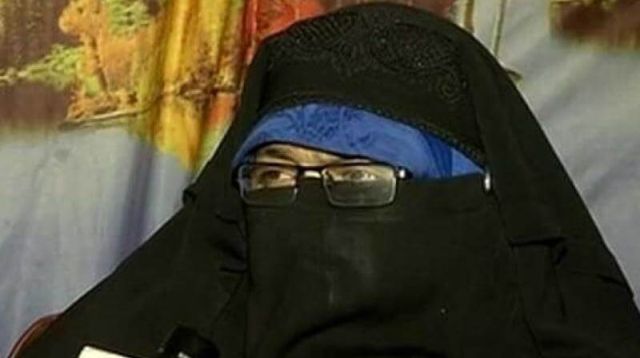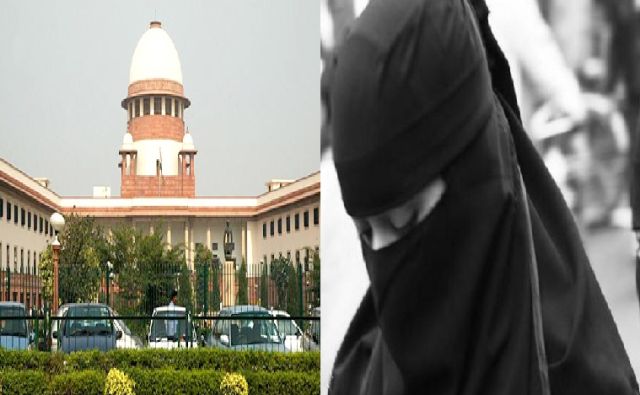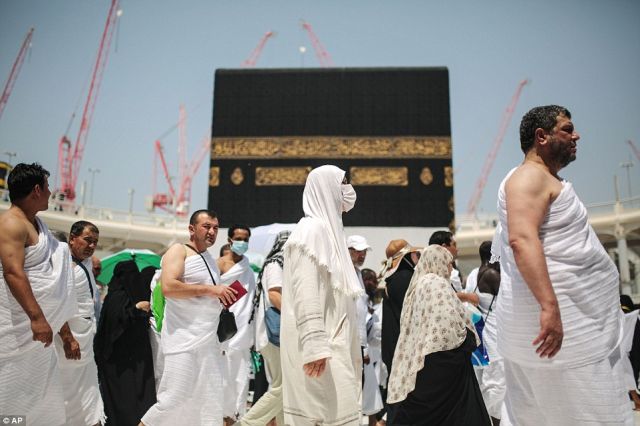
by admin | May 25, 2021 | News, Politics

Asiya Andrabi
New Delhi : Asiya Andrabi, chief of the Kashmiri women’s separatist group “Dukhtaran-e-Milat” (Daughters of Faith), and two of her associates were sent to 10 day National Investigation Agency (NIA) custody on Friday.
After Andrabi,Sofi Fehmeeda and Nahida Nasreen were presented before a Special NIA Judge Poonam Bamba in connection with a sedition case filed against them, the court allowed the agency to quiz the three accused till July 16.
Andrabi and her two associates, who were in Srinagar Central Jail, were flown to Delhi by a team of NIA officers, police sources said.
Seeking custody of the three, the NIA told the court that their custodial interrogation was required to unearth the larger conspiracy as they had made several calls to terrorists and over ground workers active in Kashmir Valley.
The agency also told the court that during the course of investigation, several mobiles numbers, used by the members and associates of “Dukhtaran-e-Millat”, were collected and further analysed.
During analysis, it was found that they are in regular contact with their associates in Pakistan and are involved in anti-India activities, NIA informed the court.
“The present investigation has so far revealed that the accused persons, namely Asiya Andrabi, Sofi Fehmeeda and Nahida Nasreen, are found involved in conspiracy and acts to severely destabilise the sovereignty and integrity of India,” the agency said.
“By their activities on cyberspace, they are running a concerted campaign to solicit support of Pakistani establishment which inter-alia includes arranging support from terrorist entities in Pakistan,” the agency added.
Defence counsel Satish Tamta has opposed NIA’s plea seeking custody of the accused.
NIA has alleged that Andrabi and her associates are actively running terrorist organization “Dukhtaran-E-Millat” and using various media platforms to spread insurrectionary imputations and hateful speeches that endanger the integrity, security and sovereignty.
The accused are promoting enmity and hatred between different communities and have entered into a criminal conspiracy to wage war against the government of India, it said.
The agency has booked them under various sections of Indian Penal Code and Unlawful Activities (Prevention) Act.
—IANS

by admin | May 25, 2021 | Business Summit, Entrepreneurship, Events, News, Social Round-up, Women Entrepreneur

Internationally acclaimed social activist Mrs. Uzma Naheed of Mumbai addressing a Press Conference in Bhopal
By Pervez Bari, Maeeshat.in,
Bhopal: A 3-day National Exhibition & Shopping Carnival which is christened as “Jazba” is being organised by women here from March 16-18, 2018 in Hindi Bhavan under the aegis of an NGO of women called IIWA, (Iqra International Women’s Alliance). It is being held under able supervision of internationally acclaimed social activist Mrs. Uzma Naheed of Mumbai.
Mrs. Uzma Naheed, president of IIWA, made the above announcement while addressing news persons here on Wednesday. She informed that IIWA is an NGO working for Socio-Economic Empowerment, (SEE), of the underprivileged women. Women need a platform, a place where they can securely make use of their talent in a financially rewarding way. With constant hard work IIWA has successfully involved 3000 underprivileged women across the country producing more than150 items.
Mrs. Naheed, who is very much active in empowering women of underprivileged class, Manoj Shrivastva, Principal Secretary in the Department of Commercial Tax, Culture and Religious Trusts and Endowments Govt. of MP, will be the Chief Guest in the inaugural function which would be held on March 16th from 10 am in Hindi Bhavan, near the Polytechnic square.
She said that IIWA encourages them by nurturing the creativity of the women’s inherent natural talents in production of various handicraft items which have ready market. IIWA uses its creativity in modifying the existing arts and crafts of each state of India as per the latest trend. IIWA believes in forming an alliance with NGOs, Media and Corporate sector; this concept was highly appreciated by the United Nations in the International Conference in Turkey.
Mrs. Naheed told a questioner that IIWA also promotes women to develop new skills or modify their products to suit current trend with continuous training and workshops. In short IIWA is a platform where talents meet opportunities to womenfolk so that they manufacture any product without disturbing their family lives. Their main concern is 1. What to make? and 2. Where to sell? IIWA helped thousands of women in establishing their own business and improve their earnings. The economic uplift of women is the main agenda of IIWA, she declared.

A poster of the 3-day National Exhibition & Shopping Carnival which is christened as “Jazba”
Meanwhile, recalling Justice Sachar Committee Report Mrs. Naheed said that it had declared that Muslims are under the Below Poverty Line and Muslim women have crossed the dangerous line. It means this is an emergency situation where it is necessary to work for economic empowerment of women. As such IIWA an NGO of women is working with all communities as poverty is a curse for every one.
“We are happy that the Govt. of India is very concerned on this subject particularly women empowerment. India is a large country where every community should come forward to serve to poor and provide them an opportunity with new ideas of business to uplift them economically. If every Indian worked for this cause it will help us to alleviate poverty by providing opportunities to the talents they have. Women are working as labourers earning paltry sum”, she stated.

by admin | May 25, 2021 | News, Politics
 By Parmod Kumar,
By Parmod Kumar,
New Delhi : The Supreme Court stood out in 2017 for protecting and advancing the rights of citizens in more ways than one, but primarily by empowering them against any intrusion of their privacy by the State or the private sector as it elevated the right to privacy as a fundamental right.
The Supreme Court will be quoted not just for its verdict expanding the scope of the Right to Life by including within its ambit the sacrosanct Right to Privacy, but it will also be counted for its pronouncements that instant triple talaq was unconstitutional and sex with a minor wife in a child marriage amounted to rape.
The Year 2017 also saw the top court’s collegium finally putting in the public domain its deliberations on the appointment, transfer and elevation of High Court and Supreme Court judges with an explanation as to why a particular name was recommended or not.
This was viewed by some as the collegium throwing down the gauntlet for the executive, which is insisting on a provision in the Memorandum of Procedure (on appointments) that it can block a recommendation on the ground of national security but without elaborating on this.
The apex court did make serious efforts in making the government act on curbing advertisements and information on sex determination techniques available on the Internet but did not succeed to the extent that was expected.
In the end, virtually nothing was achieved in the matter as, even after a decade, says senior counsel Sanjay Parikh, and despite several court directions, the offending advertisements continue to appear on the Internet in violation of PNDT Act, resulting in a skewed girlchild ratio in some northern states.
All this apart, there is hardly an area impacting the life of the common people that escaped the top court’s scanner, be it clean air to breathe, making politics free of tainted politicians, baring the chilling insensitivity of the powers that be denying relief to the farmers faced with drought or not getting a just and reasonable minimum support price for their agriculture produce — leading to suicides.
Describing the 2017 as an “eventful year” with top court “standing up to the challenge” in addressing the issues of “great promise”, senior counsel C.A. Sundram said that Supreme Court has reaffirmed itself as the “final guardian” on any matter that affects the public at large.
“The court has also clearly established that with regards to any matter that affects the public at large they are the final guardians and have acted as a sentinel to protect the fundamental rights of the citizens,” Sundram told IANS.
“The decision in right to privacy is a sterling example,” said Sundram, a view also shared by activist lawyer Prashant Bhushan and senior counsel Colin Gonsalves, well-known for espousing social causes.
“I think the Supreme Court has done extraordinarily well on social issues — but only up to a point,” said Gonsalves.
The top court’s pronouncements to cleanse the legislatures of tainted law makers that started nearly a decade-and-a-half ago and mandating the disclosure of the assets and criminal antecedents continued in 2017 when it proposed setting up of courts to exclusively try criminal cases against the law makers and politicians.
It approved the setting of 12 exclusive courts to fast-track the trial of 1,571 pending cases against lawmakers. “Let us not get bogged down… let them set up 12 courts… It is not an end of it. Starting something is difficult.”
Recognised the world over for its role in protecting the environment, the Supreme Court acted decisively as it prohibited the registration of vehicles that do not meet BS-IV emission standards from April 1, 2017, banned the use of pet-coke and furnace oil in the National Capital Region and, above all, stopped the sale of fire crackers during Diwali celebrations — a step which earned it both laurels — for relatively less polluted post Diwali morning — and brickbats, with some equating the ban on the sale of fire crackers as an assault on the Hindu religion.
The top court also came to the rescue of home buyers who have been deprived of their rightful dwellings years beyond the due date by the big real estate companies.
Besides achievements, the top court had its troubled spots too — its tussle with the executive on one hand and with a section of bar on the other.
However, when the government sought to criticise the top court for its pro-active approach and stepping into its policy-making domain, Chief Justice Dipak Misra was more than candid saying that the “protections of the fundamental rights of every citizen was a sacrosanct duty of the judiciary conferred by the Constitution”.
The apex court seemingly succeeded in taming a section of the the bar seeking an SIT probe into the allegations of graft vis-a-vis a medical college involving a retired judge of the Orissa High Court, but not without its image taking a blow as it observed that its image has been damaged as “unnecessary doubts about the integrity of the institution have been created”.
(Parmod Kumar can be contacted at saneel2010@gmail.com)
—IANS

by admin | May 25, 2021 | News, Politics
 New Delhi : In a bid to empower Muslim women, the government has changed the law by permitting them to travel for the annual Haj pilgrimage without any male attendant, Prime Minister Narendra Modi said on Sunday.
New Delhi : In a bid to empower Muslim women, the government has changed the law by permitting them to travel for the annual Haj pilgrimage without any male attendant, Prime Minister Narendra Modi said on Sunday.
“I noticed that if a Muslim woman wanted to go for the Haj pilgrimage, they cannot go without a ‘Mahram’ (a male guardian),” Modi said in 2017’s last edition of his radio programme ‘Mann Ki Baat’.
“And when I enquired about it, I came to know that it was we who have have restricted them for going alone for the Haj. This practice is not followed in many of the Islamic countries,” he said.
Modi added that the Minority Affairs Ministry has removed this restriction and will now allow the Muslim women to travel to Haj without a male attendant.
“Till date, 1,300 women have applied to travel for the Haj without any Mahram,” the Prime Minister said, adding that “they should get equal opportunity as the men get”.
—IANS

by admin | May 25, 2021 | Opinions
 By Amulya Ganguli,
By Amulya Ganguli,
Only the naive will believe that deep concern for the welfare of Muslim “sisters” and for the maintenance of the “dignity of women” and “gender equality” persuaded the Bharatiya Janata Party (BJP) to introduce the bill in parliament to ban the practice of triple talaq.
For a party whose founder in its previous incarnation, Syama Prasad Mookerjee, thought that only a civil war can solve the Hindu-Muslim problem, as Tripura’s Governor, Tathagata Roy of the BJP, reminded us recently, and a BJP candidate in the Gujarat elections sought a reduction in the numbers of “topi and dadhiwalas” (sartorial allusion to Muslims), it strains credulity to believe that it has been guided solely by laudable motives to put an end to an admittedly reprehensible custom.
The belief will persist, therefore, that it is a desire to “garner votes” which is behind the decision, notwithstanding Law Minister Ravi Shankar Prasad’s disavowal of such an intention.
Few will deny, of course, that the practice itself is highly condemnable, not least because it is illegal even in Islamic countries. For a secular country, therefore, to allow it to prevail points to a flawed outlook whose roots lie in political calculations.
It cannot be gainsaid that the BJP is outlawing triple talaq for gaining political mileage both from sections of Muslim women and from those Hindus who will see the proposed law, first, as an example of “brother” Modi’s distress over the sufferings of Muslim women and, secondly, as a message to Muslims in general that the days are gone when they were given excessive leeway by less assertive governments.
The “secular” rulers of the past, on the other hand, also thought that they will gain votes by pandering to the predilections of the obscurantists among the minorities.
The worst example of this regressive attitude was the Shah Bano episode when the Rajiv Gandhi government negated a Supreme Court verdict in favour alimony for a divorced Muslim woman on the advice of Muslim fundamentalists.
Since the BJP’s rise from the sidelines of politics to the mainstream can be traced to that event in the mid-1980s, the Congress will have to tread carefully in deciding on its stance on the bill which has followed the Supreme Court’s recent declaration of triple talaq as unconstitutional in a case involving the litigant, Shayara Bano.
The difficulty for the Congress is that it has given secularism a bad name by making the concept virtually synonymous with minority appeasement. While the BJP will not mind being closely associated with Hinduism, the Congress has been trying to shed the impression that it has become “mussalmanon ki party” or a party of Muslims, as the Congress leader, Ashok Gehlot, has said, ever since the 2014 defeat made it aware of this unwelcome image, as the A.K. Antony report pointed out.
The triple talaq bill gives it an opportunity to refurbish its reputation by articulating a rational position on drafting the law, aiming at protecting Muslim women from cruel and whimsical divorces and at the same time ensuring that the legislation does not lead to a police witch-hunt targeting men. Since the bill has still to pass through the Rajya Sabha, Parliament’s upper house, there is ample scope for fine-tuning it for smoothing out the rough edges, the most egregious of which is to introduce an element of criminality in a civil legal procedure.
If the Congress and other “secular” parties play a leading role in ensuring that the new law will unequivocally serve the ends of justice where no one — neither the women, nor the men, nor the children of divorced parents — will suffer, then these parties will be able to retrieve much of their lost reputation about cynical kowtowing to bigots in the Muslim community and reassure the country in general that politics can rise above partisan and opportunistic considerations.
From this standpoint, the bill provides a golden opportunity to the secular outfits even if the BJP runs away with much of the credit for introducing it.
Outside of politics, what is noteworthy is the failure of the Muslims to deal with the problem on their own. But ever since partition robbed the community of bold, educated leaders and self-confidence by inducing the minority complex of being forever under siege under the numerically superior Hindus — unlike other minorities like Sikhs and Parsis who have retained their poise and self-belief — the Muslims have come under the retrogressive influence of the mullahs with the result that they have remained stuck in the past.
Triple talaq is one manifestation of such backwardness along with polygamy and the veiling of women as they reinforce the age-old patriarchal norms. Only a small section of upper middle class women — film stars and sports personnel being prominent among them — has been able to extricate themselves from the grasp of medievalism and enter the modern world. But the majority of the poor and lower middle class women have been denied the opportunity of advancement by orthodox Muslim society.
The new law offers them a ray of hope.
(Amulya Ganguli is a political analyst. The views expressed are personal. He can be reached at amulyaganguli@gmail.com)
—IANS






